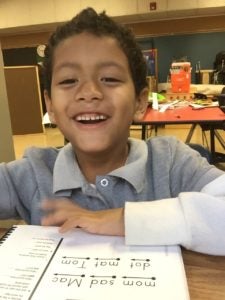by Grace Blakistone, 2016-17, 2017-18 Literacy First Tutor
We often hear that tutors are drawn to our program by our mission of educational equity, so much so that it becomes ingrained in their life’s work. After leaving the Literacy First program, many tutors go on to work in public policy, justice, and human services, as well as education. For Grace, a second-year tutor from California, our mission has become her calling. Here’s the story of her journey in her own words.

I had been waitressing for 8 months and was finally finishing up my last undergraduate course to complete my B.A. in Psychology in Santa Cruz. I saw my professional future in the social work and mental health field but lacked goals for a more specific career path. And so, two weeks before the program’s start date, I accepted my position with Literacy First and took my last final, and two days later moved my few possessions out to Austin. I was feeling adventurous, with a desire to be a part of something beneficial and was anxious about accepting the offer for lack of other plans.
I had no idea what to expect. I had never worked with children before. I had not been inside an elementary school since I attended one. I knew my service year would be important to many low-income students struggling to develop early literacy skills. What I did not know was how important it would become to me.
Working with the same 11 students every day gave me the opportunity to build strong relationships with my students. They worked hard, improved their reading skills, and told me all about their lives. I fell in love with the children and felt their successes as my own.
And I found myself continuously frustrated by the external forces that were holding these children back.
The literacy gap is often present when students step into that kindergarten classroom on the first day and widens rapidly if not identified and caught early. Reading is the basic foundation of education. Without literacy, acquisition of knowledge and educational success is limited.
I came to realize that inequity lies at the heart of many inadequacies in academic readiness. We need to empower communities to break down barriers and mitigate risk factors. Involving student families and communities is vital to promoting literacy, mental health, and educational development in all aspects of the child’s life.
Being a part of Literacy First gave me a sense of hope and opportunity for change. My amazing students gave me direction. Next year, I will begin a graduate school program with a certification to become a school psychologist. I want to provide academic and psychoeducational supports, assessments, positive school collaboration, and advocate for change within multicultural schools in order to impact and promote academic success for a greater number of students.
My goal is to create equity in education among at-risk communities and provide responsive support for a culturally diverse set of emerging readers. Supporting literacy development create successes in our communities. Social disparities and circumstances should not predetermine a child’s place in the world. Despite the tremendous hurdles and inequalities they go through each day, when we provide a positive space and sufficient support, these children do not give up.
Neither should we.

